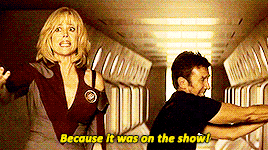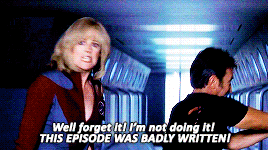a (fanfic) writing sideblog | merry | ao3: thefictionfairy | main: amerrymasquerade | mcu sideblog: spideromanoff
627 posts
Quick And Easy Way To Establish Rules In Your Fantasy/scifi Universe!
Quick and easy way to establish rules in your fantasy/scifi universe!
This can apply both to magic and fictional science, because it’s essentially just a magic system in disguise!
There is a whole spectrum from hard systems (with a very particular set of rules that can’t be broken) to soft systems (characters don’t know everything about the rules and the workings or the rules are flexible). Where on this spectrum your system falls depends on you and your story.
A good way to start out is by asking three questions:
What is possible? What is impossible? What is the price?
Two stupid examples:
Fantasy: With this magic shoes you can fly ten feet above the ground. But you can only fly up, not forward. And your feet will hurt like hell for the next three days after you’ve used them.
Scifi: With this laser gun you can shoot people to stun them. But you can’t kill them with it. And to power it you need to buy a bunch of those little button batteries you never seem to get anywhere.
Try starting with those questions and work from there.
If you want to learn more about building a magic system and scifi/fantasy writing in general, check out these free lectures on youtube by author Brandon Sanderson, I learned a lot!
-
 maidenoiron liked this · 1 year ago
maidenoiron liked this · 1 year ago -
 pigeonbubblebuddy liked this · 1 year ago
pigeonbubblebuddy liked this · 1 year ago -
 emilyquinnwrites liked this · 1 year ago
emilyquinnwrites liked this · 1 year ago -
 magicthelegendary liked this · 1 year ago
magicthelegendary liked this · 1 year ago -
 skitgibceli liked this · 1 year ago
skitgibceli liked this · 1 year ago -
 writeanotherday reblogged this · 2 years ago
writeanotherday reblogged this · 2 years ago -
 gayandorian liked this · 2 years ago
gayandorian liked this · 2 years ago -
 paigeagainstdamachine liked this · 2 years ago
paigeagainstdamachine liked this · 2 years ago -
 acmoorereadsandwrites reblogged this · 2 years ago
acmoorereadsandwrites reblogged this · 2 years ago -
 sagewildflower liked this · 2 years ago
sagewildflower liked this · 2 years ago -
 irondreamlandcloud liked this · 2 years ago
irondreamlandcloud liked this · 2 years ago -
 sylviawasright liked this · 2 years ago
sylviawasright liked this · 2 years ago -
 horrgores liked this · 2 years ago
horrgores liked this · 2 years ago -
 apocalypticautumn liked this · 2 years ago
apocalypticautumn liked this · 2 years ago -
 citruine liked this · 2 years ago
citruine liked this · 2 years ago -
 iwillhaveamoonbase liked this · 2 years ago
iwillhaveamoonbase liked this · 2 years ago -
 kingfugue reblogged this · 3 years ago
kingfugue reblogged this · 3 years ago -
 approximately20blorbos reblogged this · 3 years ago
approximately20blorbos reblogged this · 3 years ago -
 approximately20eggs liked this · 3 years ago
approximately20eggs liked this · 3 years ago -
 joshuaorrizonte reblogged this · 3 years ago
joshuaorrizonte reblogged this · 3 years ago -
 missryorinechan reblogged this · 3 years ago
missryorinechan reblogged this · 3 years ago -
 missryorinechan liked this · 3 years ago
missryorinechan liked this · 3 years ago -
 deer-in-headlights-stare liked this · 3 years ago
deer-in-headlights-stare liked this · 3 years ago -
 keeningvoid liked this · 3 years ago
keeningvoid liked this · 3 years ago -
 piracyandpumpturns liked this · 3 years ago
piracyandpumpturns liked this · 3 years ago -
 friendlyneighborhood-writer reblogged this · 3 years ago
friendlyneighborhood-writer reblogged this · 3 years ago -
 friendlyneighborhoodcapricorn liked this · 3 years ago
friendlyneighborhoodcapricorn liked this · 3 years ago -
 vampiresdrinkfruitjuice reblogged this · 3 years ago
vampiresdrinkfruitjuice reblogged this · 3 years ago -
 vampiresdrinkfruitjuice liked this · 3 years ago
vampiresdrinkfruitjuice liked this · 3 years ago -
 void-fireworks reblogged this · 3 years ago
void-fireworks reblogged this · 3 years ago -
 jacqueswriteblrlibrary reblogged this · 3 years ago
jacqueswriteblrlibrary reblogged this · 3 years ago -
 big-sis-of-the-year liked this · 3 years ago
big-sis-of-the-year liked this · 3 years ago -
 blueotterkitty reblogged this · 3 years ago
blueotterkitty reblogged this · 3 years ago -
 kabwrites reblogged this · 3 years ago
kabwrites reblogged this · 3 years ago -
 ariahthinks liked this · 3 years ago
ariahthinks liked this · 3 years ago -
 targaryeninyourarea reblogged this · 3 years ago
targaryeninyourarea reblogged this · 3 years ago -
 targaryeninyourarea liked this · 3 years ago
targaryeninyourarea liked this · 3 years ago -
 rusty-shit-posts-sometimes reblogged this · 3 years ago
rusty-shit-posts-sometimes reblogged this · 3 years ago -
 shakotisss liked this · 4 years ago
shakotisss liked this · 4 years ago -
 wolfhowlingdragonflyingsirensong reblogged this · 4 years ago
wolfhowlingdragonflyingsirensong reblogged this · 4 years ago -
 musicamagicbeyondallwedohere liked this · 4 years ago
musicamagicbeyondallwedohere liked this · 4 years ago -
 vsheridanwrites reblogged this · 4 years ago
vsheridanwrites reblogged this · 4 years ago -
 flip-phones liked this · 4 years ago
flip-phones liked this · 4 years ago
More Posts from Thefictionfairy
me as a writer: Oh no I can’t write that, somebody else already has
me as a reader: hell yes give me all the fics about this one scenario. The more the merrier
my writer-dudes, if planning a plot outline on your own is too daunting, find a plot worksheet! if one is too detailed, try another. here are some at different levels of detail:
Novel-Factory — The Premise
Novel-Factory — The Skeleton
Writer’s Digest — At-A-Glance Outline
Save the Cat by Blake Snyder — Beat Sheet
Story Engineering by Larry Brooks — Story Structure
Jami Gold — Basic Beat Sheet
Annie Neugebauer — Novel Plotting Worksheet
happy plotting!
People: ACCEPT CANON
Me: WHYYY??
People:

Me:

a good writing tip i have if you wanna mature your writing is to consider that reading itself is an experience. you are crafting not just a story, but the very experience of reading.
a lot of writing advice intrinsically revolves around this fact, but i’ve rarely seen it directly stated. when people have complaints that a book uses too many modifiers for said (which is what we’re taught in grade school to learn more vocab), the annoyance comes from redundancy or clunkiness that takes the reader out of the moment.
“Aro started to laugh. “Ha ha ha,” he chucked” is the clearest example of this. It’s redundant. It tells the reader the same information three times, and that takes them out of it. Your readers are very smart and can pick up a lot of very subtle information. Very often, less is more. This is why Twilight is notoriously bad. Too many replacements for the word said that make the reading distracting, not immersive.
This is something I realized when I took workshop classes working on my degree. We got feedback on things like tone, word choice, pacing, and the overall experience of reading in addition to just the story. Readers want to be immersed in your story. Remember that great feeling you’ve gotten when you just totally slip away into the page and just lose yourself for hours? This is what you want to craft for your readers, and you can use that to your advantage: Maybe there are times when you want to pull the reader out of it because it works for your story. Then you do things like break the fourth wall, draw attention to the writing itself etc.
But the reverse is also true. You can consider things like pacing to help craft the experience of the story. If you want moments to last longer, write more about them. Flesh out the details for important scenes. You don’t need to spend paragraphs detailing every object in the room unless it’s relevant to the plot or you want to slow the story down. Conversely, you can spend less time on scenes you want to go fast, or that are less important. I do this a lot when I have time lapses where I want to portray a sense of what went on, but also want to get to the next scene. I’ll provide a few rich details as a bit of an aside to give readers the gist, then move on. If you only give a detail or two, your reader will fill out the rest, and that fact is rarely told to new writers, who find themselves trying to spend a lot of time making sure the reader’s vision exactly conforms to their own. It never will, and thats okay. That’s the beauty of it, actually. Let your readers use their imaginations. They really want to.
So yeah best piece of writing advice I realized is to consider how your book will be experienced, not just on the plot or details. This is one of those writing “use the rules and break them strategically” things, and when you consider reading as an experience it can help you with things like word choice to craft mood etc. this was really beneficial to me and i hope it can be to you as well
